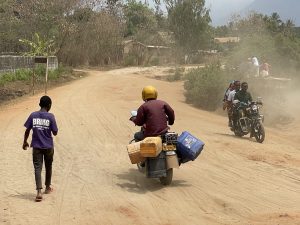When you live in Europe or other developed region and you hear of droughts, failed crops and dying cattle it’s terribly sad. The rains failing somewhere in Africa is a local and regional calamity. But this misfortune is in places you’ve never been or ever likely to go to. Ethiopia, Somalia, Angola, DRC, Chad, Niger, Mozambique are little visited beyond missionaries and NGO workers.

With COP26 recently dominating the news (and rightly so) a sharper focus has fallen on climate change, water scarcity and rising sea-levels. Here in Tanzania the rains have not come and we are at the beginning of a nationwide drought.
People are queuing for water at standpipes not only in places like Morogoro but even in Dar es Salaam. Young boys and move skeletal cattle and goats from grazing ground to grazing ground in search of slim pickings. Rivers which would normal be full remain parched and dusty.

And the dust. Oh my God, the dust is everywhere; it blows towards along the road covering all in its path in a thin red film. It chokes the air, it gets stuck in your hair and turns your white clothes to russet.
Everywhere in Morogoro and increasingly in Dar you see motorbikes carrying water bottles to and from standpipes.
The lack of water has a direct impact on everyone, not only those who rely on centralised water systems but even those like me who take water from a borehole. We are all affected by power cuts caused by the lack of water. This is because Tanzania relies so heavily on hydropower and when the rains fail there is not enough water to generate the amount of power needed for all of us.

We have daily ‘load-shedding’ power cuts in Morogoro, usually during the daytime and the cuts can last up to 8 hours. Given the accompanying high temperatures of 30+ degrees and the fact that domestic water needs to be pumped in homes and offices, we often have no light, no cooling system and no water.
I think everyone should experience for themselves the problems climate change brings to hot countries.